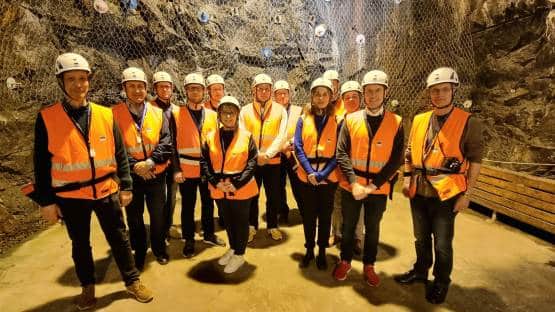
An International Atomic Energy Agency (IAEA) mission to Sweden says that the country has a comprehensive, robust and well-functioning system for safely managing radioactive waste and spent nuclear fuel from nuclear power plants and commended the country’s development of a concept for spent fuel disposal. The mission advised Sweden to improve its national policies and strategies for non-nuclear radioactive waste that originates, for example, from industrial uses, research, or medical applications.
The Integrated Review Service for Radioactive Waste and Spent Fuel Management, Decommissioning and Remediation (ARTEMIS) team concluded the eleven-day mission to Sweden on 27 April. The team comprised eight experts from Belgium, Finland, France, Germany, the Netherlands, Norway, Switzerland, the United States of America and three IAEA staff members.
30% of electricity from nuclear reactors
The mission was carried out at the request of the Government of Sweden to support the country in meeting the European Union (EU) obligations under the Council Directive on radioactive waste and spent fuel management. The mission was hosted by the Swedish Radiation Safety Authority (SSM). An observer from the European Commission attended the mission.
Sweden generates more than 30 per cent of its electricity from six nuclear reactors. Radioactive waste primarily originates from the operation of these nuclear reactors. Radioactive waste also originates from medical and research institutions and industry and consumer products such as smoke detectors. There is also an amount of radioactive waste from past activities which is stored pending disposal.
Recommendations
The team also identified recommendations and suggestions to maintain and further improve the safe and responsible management of radioactive waste in Sweden, including:
- Ensuring that safe management routes are made available for all types of radioactive waste and that sufficient resources are appropriately allocated for this purpose.
- Using the national plan as a strategic planning component to monitor the implementation of the national policies.
- Establishing a stakeholder forum to coordinate preparations for the future disposal facility for long-lived radioactive waste.
“Sweden is an example for all IAEA Member States of the safe management of spent fuel, said Hildegarde Vandenhove, Director of the IAEA Division of Radiation, Transport and Waste Safety. “I am confident that the recommended improvements related to the safe management of non-nuclear radioactive waste will be considered and implemented.”
For further information, see here.